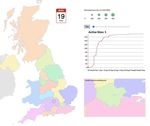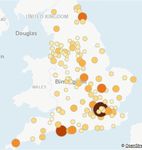Randomised Evaluation of COVID-19 Therapy: the RECOVERY trial - Collaborators' Meeting
←
→
Page content transcription
If your browser does not render page correctly, please read the page content below
Agenda
1. Introductions
2. Update on progress
• Main recruitment
• Second randomisation and convalescent plasma
3. Remdesivir
4. Hydroxychloroquine
5. Future plans
6. Q&AIntroductions • One of the central study team will talk to the agenda • If you have questions please enter them into the “Q&A” on the right side of your screen. • Questions may be answered directly or to the whole group
Current trial design
SOC + CP SOC - CP
LOP + CP LOP - CP
ELIGIBLE PATIENTS
Tocilizumab
OUTCOMES
R DEX + CP DEX - CP R2 No
additional
HCQ + CP HCQ - CP treatment
AZM + CP AZM - CP
CP vs No CPRecruitment “efficiency”
• England-only data available from
www.odp.nihr.ac.uk
• Larger darker circles indicate higher
recruitment rate per 1000
admissions
• Varies from 1.5% to 64% (over 40
fold!)
• Average 101 per 1000Characteristics at main
randomisation (n=10,755)
Characteristic N (%), mean (SD) or median (IQR)
Male sex 6786 (63%)
Age 66 (16)
Days since symptom onset 9 (5-13)
Days since hospitalisation 2 (1-5)
Severity of disease No oxygen required 2622 (24%)
Supplemental oxygen only 6633 (62%)
Ventilation/ECMO 1502 (14%)
Prior disease Diabetes 2896 (27%)
Cardiovascular disease 2903 (27%)
Chronic lung disease 2359 (22%)What can we see in data?
Characteristic % dead at 28d
Age (years)When will we get some answers? • Although over 11,000 recruited now we still need 28 day follow-up • Please keep on top of the Follow-up forms! • Due to design of trial, there are fewer than 2000 people on any one treatment (except standard of care) • Please keep recruiting! • DMC review the data every two weeks (last review 28th May)
Second randomisation
Convalescent plasma • First sites opened last week • NHSBT are busy training transfusion laboratory staff and collecting plasma • Aim is to open as many sites as possible, but rate will be determined by supply of convalescent plasma
REMDESIVIR
ACTT-1 data • 1063 participants with laboratory proven COVID-19 and hypoxia • Randomised between remdesivir (10 days) or placebo • Primary outcome: time to recovery • Recovery = discharge alive or no longer requiring oxygen or medical care • DMC stopped trial after 482 participants had recovered
ACTT-1 data (n=1063)
Characteristic N (%), mean (SD) or median (IQR)
Male sex 684 (64%)
Age 58.9 (15)
Days since symptom onset 9 (6-12)
Severity of disease No oxygen required 127 (12%)
Supplemental oxygen only 618 (58%)
Ventilation/ECMO 272 (26%)
Missing 46 (4%)
Prior disease Diabetes 275 (26%)
Cardiovascular disease 2903 (27%)
Chronic lung disease 2359 (22%)ACTT-1 results
Recovery Survival
RR 1.32 (1.12-1.55)
Median 11 vs 15 days
HR 0.70 (0.47-1.04)
% dead at 14d: 7.1 vs 11.9Remdesivir in RECOVERY • Remdesivir will be made available through Early Access to Medicines Scheme (EAMS) for selected patients with COVID-19 • Patients on remdesivir can still be recruited into RECOVERY • RECOVERY participants can be treated with remdesivir • Information on remdesivir use will be collected on Randomisation and Follow-up forms
HYDROXYCHLOROQUINE
Hydroxychloroquine
• Non-randomised analysis of factors
associated with death
• Patients given HCQ will be different
to those not given HCQ
• Non-randomised analyses cannot
fully account for these differences
so will be biased
• Authors acknowledged need for
RCTs to test HCQ reliablyDiscussions with MHRA • MHRA wrote to all trials testing HCQ and requested the stop recruitment to HCQ arms on Friday 22nd May • Updated data provided to RECOVERY DMC who met on 23rd May and concluded that no change to RECOVERY protocol was required • RECOVERY Principal Investigators spoke to MHRA on 23rd May (before DMC meeting) and 24th May. MHRA agreed to allow RECOVERY to continue pending planned DMC review on 28th May
RECOVERY DMC
28th May
“…we saw no cogent reason to
modify the protocol or intake to
the study. The committee
therefore recommends the trial
continue recruitment without
interruption until the next
scheduled meeting on 11th June.”FOLLOW-UP
Completeness is key • Weekly reminders will be sent out by trial team to PI and staff with responsibility for completing Follow-up forms, highlighting participants randomised >28 days ago without complete form • Please do complete these as soon as possible
SAE reporting
• Please remember that adverse events only need to be reported if they are
both:
• SERIOUS (e.g. prolong admission, require significant intervention to avoid life-
threatening situation)
AND
• RELATED with reasonable probability to study treatment
• Please contact coordinating centre if such an event occurs.
• Please do not use “yellow card” systemWithdrawal of consent • Participants are free to withdraw consent for study procedures at any time • It is not an “all or nothing” process. Withdrawal may be for: • Taking study treatment (e.g. they want to stop because of perceived side-effects) • Having hospital records reviewed for Follow-up form completion • Having linkage with NHS registries for long-term follow-up • If participant wishes to withdraw, please find out which aspects they wish to withdraw from and inform coordinating centre
FUTURE PLANS
Pharmaco-kinetic/-genomic substudy • Pharmacokinetics of hydroxychloroquine incompletely understood in COVID-19 population • Predictors of QT prolongation (and other electrocardiographic changes) with HCQ (and AZM) unknown • Plan to recruit patients allocated HCQ, AZM or control and measure: • ECG changes • HCQ concentrations at various time points • DNA sampling and other baseline characteristics • Please contact coordinating centre if you are interested in participation
Carry on recruiting! • No additional arms currently being planned • Need to continue recruitment and collection of follow-up information to provide DMC with information about efficacy and safety of study treatments • As admission rates fall, please focus efforts on recruiting as many admitted patients as possible • Thank you!
You can also read
























































